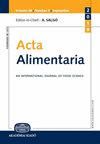产生细菌素的粪肠球菌HZ作为辅助培养物改善白卤奶酪香气形成和抗菌活性的评价
IF 1
4区 农林科学
Q4 FOOD SCIENCE & TECHNOLOGY
引用次数: 0
摘要
乳制品中使用的培养物使获得标准的工业产品成为可能。然而,它们都提供统一的味道和香气。一般来说,从生牛奶或手工奶酪中分离出的非发酵剂乳酸菌(NSLAB)在满足生物安全标准的情况下,与奶酪结合后具有不同的感官特性。粪肠球菌HZ先前从传统的土耳其奶酪中分离出来,并被确定具有很强的抗菌活性,但没有明胶酶和溶血活性。在本研究中,将该菌株作为辅助培养物用于白盐水奶酪中,以改善其理化、质地、芳香特性和抗菌活性。含有粪肠杆菌HZ的奶酪具有更高的感官评分,这可能是由于该菌株产生的芳香活性化合物。E. faecium HZ的掺入也提高了奶酪的微生物品质,并通过稳定的肠球菌素产量对指示微生物表现出抑制作用。本文章由计算机程序翻译,如有差异,请以英文原文为准。
Assessment of bacteriocin producing Enterococcus faecium HZ as adjunct culture to improve the aroma formation and antimicrobial activity in white-brined cheese
Cultures used in dairy products make it possible to obtain standard industrial products. However, they all provide a uniform taste and aroma. Generally, non-starter lactic acid bacteria (NSLAB) isolated from raw-milk or artisanal cheeses offer varied sensory characteristics when integrated in cheese provided that biosafety criteria are met. Enterococcus faecium HZ was previously isolated from traditional Turkish cheese and determined to have strong antibacterial activity as well as no gelatinase and hemolysis activities. In this study, this strain was used as adjunct culture in white-brined cheese to improve the physicochemical, textural, and aromatic properties, as well as antimicrobial activity. Cheeses with E. faecium HZ had a higher sensory score, which could be due to the aroma-active compounds produced by this strain. The incorporation of E. faecium HZ also improved the microbial quality of cheeses and showed an inhibitory effect via a stable enterocin production on indicator microorganisms.
求助全文
通过发布文献求助,成功后即可免费获取论文全文。
去求助
来源期刊

Acta Alimentaria
农林科学-食品科技
CiteScore
1.80
自引率
0.00%
发文量
47
审稿时长
18-36 weeks
期刊介绍:
Acta Alimentaria publishes original papers and reviews on food science (physics, physical chemistry, chemistry, analysis, biology, microbiology, enzymology, engineering, instrumentation, automation and economics of foods, food production and food technology, food quality, post-harvest treatments, food safety and nutrition).
 求助内容:
求助内容: 应助结果提醒方式:
应助结果提醒方式:


